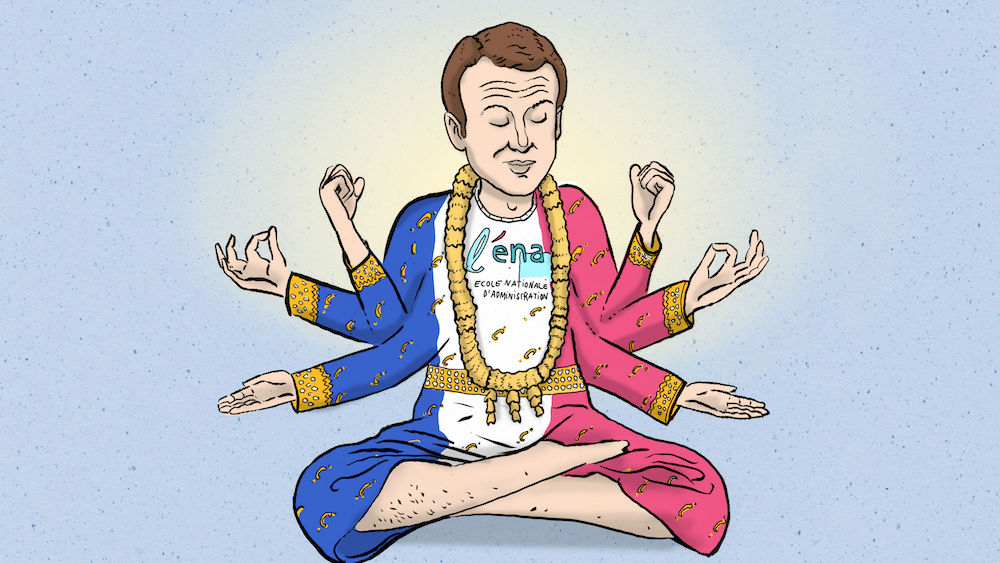For French president-elect Emmanuel Macron, these three little words are more than just a phrase he often repeats – they represent a condensed vision of the world as he sees it.
On April 17, just under a week before the first round of the French presidential elections, Emmanuel Macron faced a crowd of 20,000 supporters gathered at Bercy stadium in Paris.
“I want everyone – at some point in their life – to have a new chance,” he proclaimed. “We must be able to live, work, and learn en même temps.”
The candidate suddenly stopped, interrupting his own speech.
“Excuse me, you noticed that I used ‘en même temps,’” he said, as the crowd of supporters burst into chants of “En même temps! En même temps!”
This seemingly innocuous phrase could be translated literally as “at the same time,” but can be used to mean “however,” “nevertheless,” “on the other hand,” and a whole host of other useful linking words that acknowledge the existence of two or more conflicting ideas. Critics had picked up on the fact that Macron used it frequently and ridiculed him for it, claiming that it showed his inability to decide and masked a platform that was vague at best, intentionally opaque at worst. Macron is the man, after all, who supported a military intervention in Syria but en même temps doesn’t think Bashar al-Assad should step down immediately. He’s also the man who called colonization a “crime against humanity,” but en même temps highlights “the positive virtues of colonialism.”
“It’s a verbal tic,” Macron admitted to the crowd in the Bercy stands. But a helpful supporter rushed to his defense, shouting, “It’s not a problem!” And, indeed, Macron couldn’t agree more. “But I’m going to keep on using it,” he continued, “Because I choose growth and solidarity, liberty and equality, businesses and employees, the best of the right, the left, and the center.”
From Joke to Slogan
In later interviews, Macron continued to defend his use of the phrase as representative of his program. En même temps went from a joke to a slogan for Macron supporters, who saw their candidate’s penchant for embracing contradictions as an understanding that the world is complex, a rejection of reductionism (and thus an implicit criticism of his rival, far-right candidate Marine Le Pen).
However, there are a few more reasons this phrase became part of Macron’s rhetoric. Macron is a direct product of France’s meritocracy. He graduated from l’École Nationale d’Administration, or ENA, one of France’s most prestigious grand écoles and a training ground for the country’s political elites. Graduates of the ENA – called by the rather ungraceful nickname énarques – are actually famed for speaking in a way that erases conflict while presenting opposing sides. The French even have a name for the technique – it is called balancement circonspect (which loosely translates as “circumspect swaying,” a way to say one thing, its opposite, and, ultimately, nothing at all). Earlier this spring, Jérôme Guedj, spokesperson for Socialist presidential candidate Benoît Hamon, complained that Macron “says everything and then adds little bit of the opposite.”
Though this language is most often associated with elite French institutions (ENA is, first and foremost, a school of administration), Macron is far from the first to bring this style of reasoning to politics. Indeed, current French President François Hollande, also an énarque, has been accused of “balancement circonspect” by political rivals, including far-left presidential candidate Jean-Luc Mélenchon. Centrist politician François Bayrou, who ran for president in 2007, also had a similar for-and-against way of looking at the world (though he is not an énarque). Bayrou finished third a decade ago, but the political context was different back then – the divide between the right and the left was sharper, and both sides were fielding strong candidates (Nicolas Sarkozy and Ségolène Royal).
Scooping Up the Center
In the 2017 elections, there was a niche for someone able to consider two ideas en même temps. François Fillon, the presidential candidate fielded by the Republicans, was farther to the right than a lot of his party members, while the Socialist candidate, Benoît Hamon, sat farther to the left – both were perhaps results of the fact that they were selected through open primaries, in which only the most die-hard party members usually turn up to vote. So when Macron used “en même temps” to embrace traditional left and right political ideals, he bridged the left-right divide and scooped up voters who might sit more to the center of the political spectrum. In fact, Macron’s most famous “en même temps” moment was perhaps when he proclaimed, “I’m from both the left and the right” – which clearly helped him in the first round of the election.
However, arguably the most significant support for Macron came from people who opposed his rival, Le Pen. Here en même temps was directly opposed to the rhetoric of Le Pen, who claimed to be neither right nor left. While Le Pen rejected, Macron embraced. She wanted to break with the European Union, stop using the euro, and halt most immigration. Macron, on the other hand, wanted to reconcile what might be seen as opposing ideas. A study by French polling company Ifop showed that optimistic, happy people tended to support Macron, while pessimists were more likely to vote Le Pen (though economic conditions could explain both these voters’ moods and their political preferences). Macron is pretty peppy – this is the politician, after all, who gave an entire speech telling his followers that “when everything seems sad, when everything seems lost or gloomy, you must think of spring,” a line so chipper it could come from a Disney musical with animated flowers and frolicking woodland creatures. Le Pen, on the other hand, tends to have a lot to say about the winter in which France currently finds itself.
Macron has made it clear that en même temps is more than just a phrase he repeats a lot – it’s a boiled down vision of the world as he sees it. The joyful irony for his camp is that they uncovered a simple, catchy slogan – perfect for memes, videos, and jokes with journalists – that highlighted the way that Macron embraces complexity. In an era of social media dominance, when having a slogan such as “Make America Great Again” can mobilize the masses, no centrist candidate yet has come up with such gold. When people joke about en même temps, Macron just smiles – because they are already talking on his terms.
Read more in the Berlin Policy Journal App – May/June 2017 issue.








